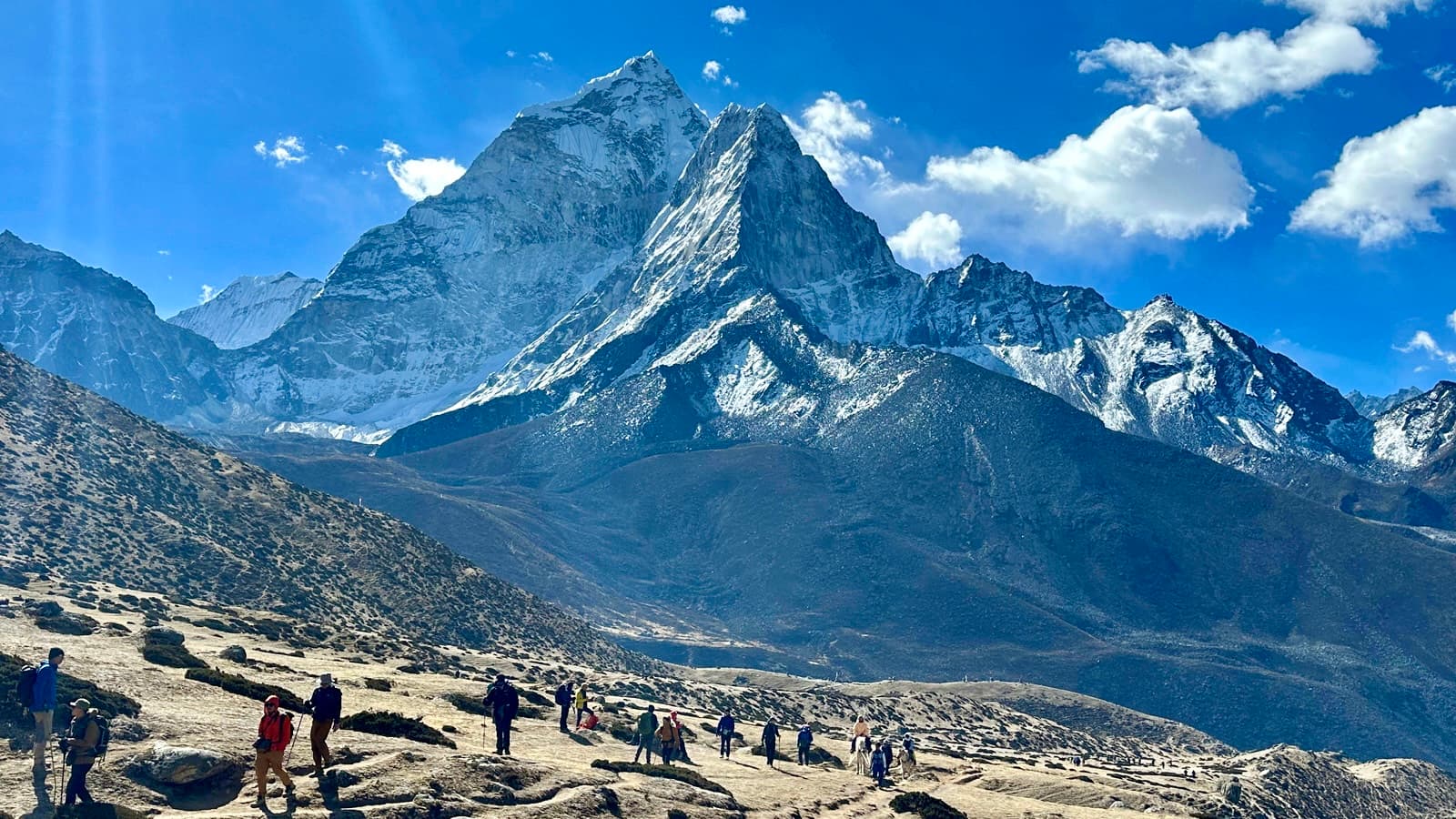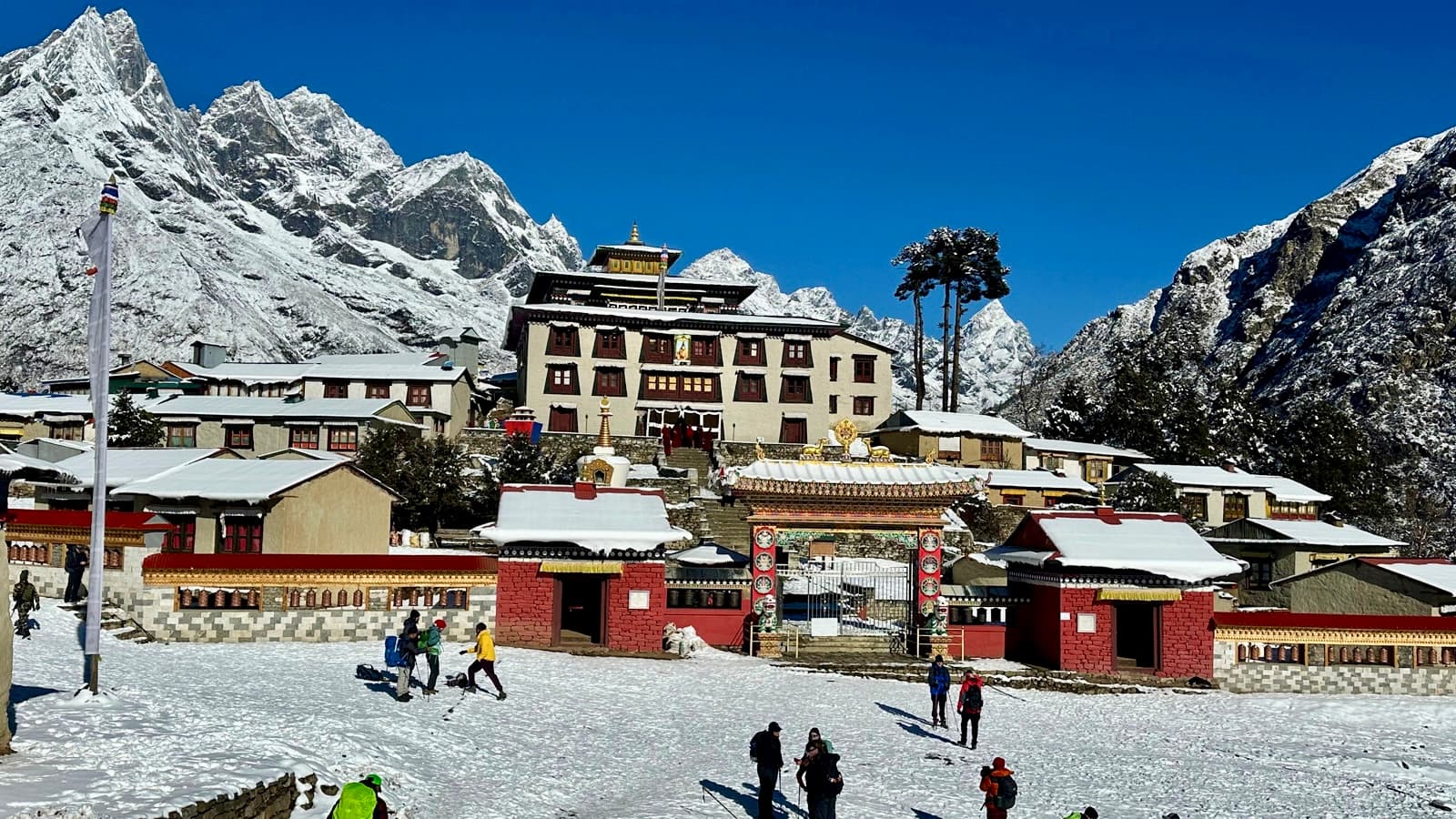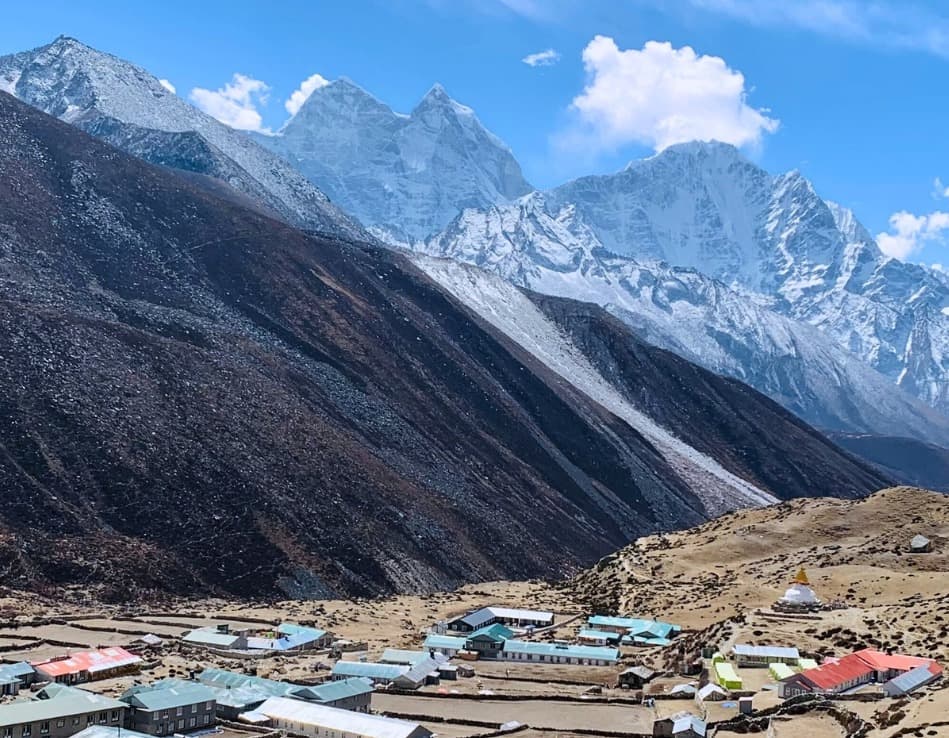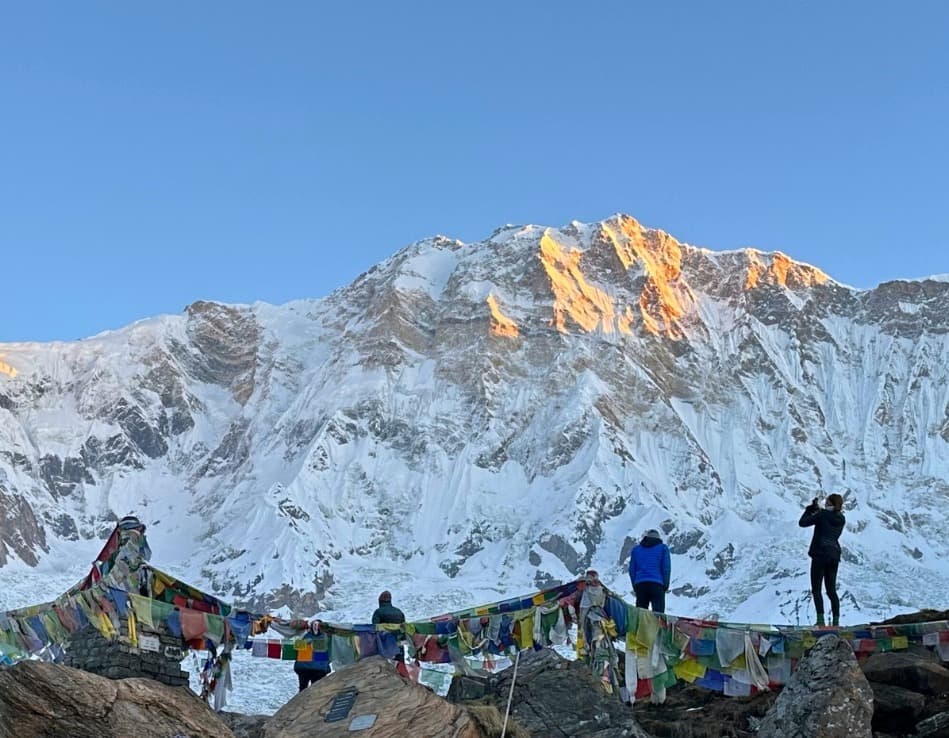Everest Base Camp Trek




Trip Fact
- DestinationNepal
- Durations14 Days
- Trip DifficultyModerate
- ActivitiesTrekking
- AccommodationHotels / Teahouses
- MealsBreakfast, Lunch, Dinner
- Mx.altitude5645m.
- VehicleCar / Flight
- Group SizeMin. 1 Pax
Everest Base Camp Trek Highlights
- Experience one of the world's most thrilling flights to Lukla
- Explore lively Namche Bazaar & Everest View Hotel
- Adore enticing views of rich natural landscapes amidst numerous Himalayan giants
- Visit the grand Tengboche Monastery - a religious hub in Khumbu
- Traverse-rich Sagarmatha (Everest) National Park
- Reveal yourself to four of the mighty eight-thousanders (Everest, Lhotse, Makalu & Cho Oyu)
- Hike to Everest Base Camp (5,364m) & beyond to Kala Patthar (5,645m)
- Learn about local Sherpa people, their culture & lifestyle
Overview
Everest Base Camp EBC Trek is not just a journey it's a gateway to unique experiences, stunning nature, rich culture, and marvelous landscapes of eastern Nepal. This trek offers a blend of exceptional delights on everyone's bucket list. From the start of early successful ascents, millions have traveled here to witness the top-standing structure of Mother Nature. Many travelers are inspired and have great tales from journeying around the Everest region. The fantastic Khumbu terrains and magnificent hiking experience leave a lasting impression on almost everyone here.
Indeed, you don't get to witness the highest mountain standing serene and ever so majestic in its glory daily! However, a trek to Everest Base Camp is what you can take to experience it for once anyway. The trail covering unique vegetation, wildlife, and spectacularly diverse landscapes is more fantastic than any corner of the world. This EBC Trek package is an opportunity that allows you to scale the lap of magnificent Mount Everest along with its surrounding peaks in the most secure and safe environment. The bright landscapes of sparkling mountains and valleys and the Everest Base Camp Trek also let us experience diverse groups of people and their ethnicities, traditions, and lifestyles. The eminence of Sagarmatha, head of the sky, looms up in its glory with striking peaks like Mt. Lhotse, Nuptse, and beautiful Ama Dablam along the hike. Furthermore, the region's charismatic affluence will undoubtedly inspire and intrigue you.
A short, dramatic fight to Lukla shall start the trekking journey to EBC. The flight is a beautiful cacophony of bustling towns emerging to isolated valleys and the blanket of jaded green forests and frolicking rivers greeting you and welcoming you to this brilliant trip. We will take an acclimatization hike to settle our bodies to ever-increasing elevation. You shall then trek to Namche, the heart of Khumbu and a historic trade hub for merchants. Namche Bazaar lies underneath a mountain peak called Khumbila, which translates to "God of Khumbu." The mountain is considered too sacred to be climbed as it is believed to be a home for the patron god. Walking to the Tengboche Monastery, we get to behold the stunning sights of Everest and Ama Dablam Massif ahead! The walk to Tengboche is fantastic, soaking us in its ethereal beauty.
During the Everest Base Camp Trek, we will also pass by the Pangboche Village, the region's largest Sherpa settlement. We can visit the Pangboche Monastery and continue to Everest Base Camp, where the mightiest of all, Mount Everest, awaits us, ever so sharp in its unrivaled existence.
The Best Time to Hike Everest Base Camp Trek
Many adventurers dream of embarking on the Everest Base Camp trek, but choosing the right time can make all the difference. With its awe-inspiring peaks, picturesque landscapes, and rich Sherpa culture, planning well to maximize your experience is crucial.
The trek is primarily doable during two main seasons: pre-monsoon (March to May) and post-monsoon (late September to December).
Pre-Monsoon (Spring): March to May
Spring is considered the best time for the Everest Base Camp trek. The weather is relatively warm, especially at lower elevations, and the visibility is usually straightforward. Rhododendron flowers are in bloom, adding beautiful colors to the landscape. However, the trails can be crowded, so booking in advance is wise.
Post-Monsoon (Autumn): Late September to December
Autumn is another favorable time to embark on this trek. The monsoon rains clear the dust, offering stunning views of the peaks, and the temperatures are still pleasant, although they can drop significantly at higher altitudes. Autumn generally has fewer trekkers, allowing for a more serene experience.
When to Avoid
The monsoon season (June to early September) is best avoided due to heavy rains, potential landslides, and poor visibility. Similarly, the winter months (January and February) can be incredibly harsh and challenging due to heavy snowfall and freezing temperatures.
The Everest Base Camp Trek is not just a trek; it's a once-in-a-lifetime opportunity to immerse oneself in some of the world's most breathtaking scenery. Considering the weather, crowding, and individual preferences, careful planning will ensure an unforgettable journey that inspires and amazes you.
Wi-Fi and Internet
Several internet cafes along the route ensure you stay connected with the world. One is in Lukla, and several are in Namche Bazaar. After that, several are scattered along the way, including a good one in Gorakshep. However, these internet cafes are sometimes unreliable, and the signal often needs improvement or recovery. Most guest houses will offer Wi-Fi, which comes at a cost that is usually more expensive than an Internet cafe. This ensures you can stay connected throughout your trek, albeit at a slightly higher price.
Everest Link or air-link provides internet service along the route. This is the most cost-effective option, but it is limited in availability. You can purchase access to Everest Link for your trek while at Lukla. Because the same provider provides the entire region, all Wi-Fi along the route goes down when Everest Link goes down.
Shower Facilities
At lower altitudes, most of the Guesthouses provide hot shower facilities during the early stages of the Everest Base camp trek. The showers are heated by solar power, so hot water may be unavailable if it has been cloudy for a few days. Hot water showers are chargeable for around $4 to $7 for each use. The exact cost of the hot shower depends upon the facilities at each guesthouse and the elevation. If you want to shower at a lower price, you can get a bucket shower in many lodges in lower elevations, which costs around $2 to $5, but in the higher villages, the price may be higher.
If you do not wish to pay for a shower, you can carry wet wipes to clean the body. A sponge or damp towel wash could be another option to minimize the hot water expense. A hot shower might be an extravagant luxury because the Everest Base Camp area is remote, with high altitude and low temperatures. Showering daily is also not advisable, especially as you get higher and the temperatures drop.
Drinking Water
Drinking fluids during the trek is vital to maintaining your body's hydration level and avoiding altitude sickness. Around 3 to 4 liters of fluid is recommended for daily trekking intake.
Bottled Water
Although this is the most convenient option, it is not environmentally friendly and has yet to be tested for quality. You can carry your water bottle, refill it, and filter/sterilize it to drink. Boiled water is the safest and most convenient option. Most guesthouses will serve it, which is excellent for warding off the cold. Cold, untreated tap water is free and not recommended.
Purchase a Sterilization
UV technology is an easy and effective solution that kills 99.9% of bacteria, viruses, and protozoa, quickly turning tap water into safe drinking water. Read the directions carefully and use the pen for the required duration. Water purification tablets or chemicals like chlorine dioxide are commonly used. They are easy to carry and inexpensive to buy. However, they are less effective than UV filters or boiled water and need a few hours to act. Purifying your water for the next day before bed would be best if you choose this method.
Physical Fitness for Everest Base Camp Trek
The journey to Everest Base Camp will be much more enjoyable, and the chances of completing the trek will be greater if one is in good physical shape. This trek includes 5-7 hours of hiking per day on rough, sometimes steep, terrain, often at a high altitude with low oxygen levels. One needs to get into routine cardio activities such as running, cycling, or swimming to be prepared. This should be combined with strength training, but more importantly, leg workouts. We also suggest including hill climbing or stair climbing in your workout regime to give you a feel for the trekking conditions. If you are well-prepared, you will stay confident throughout, and that makes this magnificent journey very special.
About Flights to Lukla Airport
Flights from Kathmandu to Lukla are the primary gateway for trekkers heading to the Everest region, offering a quick yet thrilling way to begin the adventure to Everest Base Camp. The flight typically lasts around 25-30 minutes and covers the 138-kilometer distance between Tribhuvan International Airport (KTM) in Kathmandu and Tenzing-Hillary Airport (LUA) in Lukla, one of the most exciting and challenging airports in the world, known for its steep, short runway nestled in the mountains.
Three main airlines serve this route Tara Airlines, Summit Airlines, and Sita Air. These flights generally depart in the morning, with the first flights around 6:00 AM, and typically run until 10:00 AM. However, due to the unpredictable weather conditions in the Himalayas, flights can often be delayed or canceled, particularly in winter and during the monsoon season. It’s important to allow for flexibility in your schedule and have contingency plans in case of flight disruptions.
Weight Limit For Lukla Flight
The weight limit for flights from Kathmandu to Lukla is typically 15 kilograms (33 pounds) per person for checked luggage. This limit is strictly enforced by the airlines due to the small size of the aircraft and the limited cargo capacity. Passengers are allowed to carry additional weight in the form of hand luggage, but this is usually restricted to 5 kilograms (11 pounds). If you exceed the weight limit, you may be required to pay additional fees or arrange for the excess baggage to be sent by another means, such as via a porter or a cargo flight.
Preparing for the flight to Lukla requires careful attention to the weight limit. Airlines said only 15kg for each person including a hand carry bag as excess luggage can pay extra charges, making it essential to pack efficiently.
Alternative Everest Region Treks
Escape Himalaya provides the most excellent services related to trekking in Nepal, from brilliant accommodation facilities to the most talented and trustworthy guides for the trekking journey. So join us for the most remarkable escape of your life. Explore the Himalayas with us! You can do 13-Day Everest Base Camp Trek as a shorter version of this trip. Also, Gokyo Lake Trek is another journey to experience Mount Everest from different angles alongside azure glacial lakes. The Everest Chola Pass Trek lets you pass high moraines and mountain passes. The Everest Panorama Trek gives a similarly impressive vista of the Everest Massif in comfort. Also, you can opt for a customizable itinerary if you wish.
Detail Itinerary
Arrival at Tribhuwan International Airport, Kathmandu
Fly to Lukla And trek to Phakding
Trek to Namche Bazaar
Acclimatization day at Namche Bazaar - Hike to the Everest View Hotel & return
Trek to Tengboche
Trek to Dingboche
Acclimatization day at Dingboche - Hike to Nangkartshang Peak
Trek to Lobuche
Hike to Gorak Shep, continue trek to Everest Base Camp & return to Gorak Shep
Hike to Kala Patthar & trek back to Pheriche
Trek To Namche
Trek back to Lukla
Flight back to Kathmandu
Farewell
If the provided schedule isn't suitable for you, we are able to create personalized travel arrangements according to your preferences and requirements.
Cost Details
Cost Includes
- All ground (airport/hotel) transfers by private vehicles
- Two nights accommodation with breakfast at a 3-star category hotel in Kathmandu
- Full board meals (Breakfast, Lunch, Dinner) with tea/coffee during the trek
- Seasonal fruits - after dinner snacks during the trek
- Best available twin sharing lodge to lodge accommodation during the trip (We provide attached bathrooms with hot showers at Lukla, Phakding, and Namche.)
- One highly experienced, helpful, and certified trekking guide and porters to carry luggage (1 porter for two people), including their food, accommodation, salary, equipment, and accidental insurance
- Round trip flight Kathmandu – Lukla and Lukla – Kathmandu, including departure taxes
- Escape Himalaya Duffle Bag, Down Jacket, and Sleeping Bag during the trek
- Escape Himalaya T-shirt, Trekking Map, and Trip Achievement Certificate
- A comprehensive first-aid medical kit
- Sagarmatha National Park Permit and Khumbu Pasang Lhamu Rural Municipality Entrance Permit Fees
- All government taxes & office service charges
Cost Excludes
- Lunch and Dinner while in Kathmandu
- Travel Insurance
- International Airfare
- Nepal Entry Visa (You can obtain a visa upon your arrival at Tribhuwan International Airport in Kathmandu. A multiple-entry tourist visa suitable for 30 days can be obtained by paying USD 50 or equivalent foreign currency. Similarly, multiple-entry tourist visas for 90 days can be obtained by paying USD 125. Please bring two copies of passport-size photos.)
- Cold drinks including coke, water, Fanta, etc.
- Snacks and other personal expenses
- Hot showers during the trek except in Phakding, Namche, and Lukla
- Personal Trekking Equipment
- Wi-Fi / Internet during the trek
- Tips and gratuities for trekking staff and drivers
Dates & Availability
Good to Know
Everest Base Camp Essential Trek Guide
Planning an EBC Trek? Here are the Top 10 key things to know for an incredible adventure:
- Season's Greetings: Pick the perfect time to go! Spring (March-May) and autumn (Sept-Nov) offer clear skies and stunning views.
- Pack Smart: Travel light! Choose a comfortable backpack and pack only essentials for the changing weather.
- Go at Your Own Pace: Don't rush! Enjoy the scenery and listen to your body. Slow and steady wins the race.
- Train Like a Champ: Get in shape! Hiking at altitude requires some physical preparation.
- Mind Over Mountain: Be prepared for challenges! A positive attitude goes a long way.
- Fuel Your Hike: Eat healthy! Choose nutritious food to keep you energized throughout the trek.
- Gear Up for Success: Dress for the elements! Pack clothes and footwear suitable for mountain weather.
- Stay Hydrated: Drink plenty of water! Dehydration can be a problem at high altitudes.
- Plan Your Path: Find a suitable itinerary! Choose a route that matches your experience and desired duration.
- Respect the Locals: Be a good guest! Learn some basic Nepali phrases and be mindful of local customs.
Bonus Tip: Capture the memories! Take photos and videos to document your incredible journey.
Additional Cost Planning
Apart from the significant costs of your EBC trip package, you will need to budget for specific additional fees. Here's a simple plan to help you budget while still having a good time:
Trail Necessities:
- Hot Gas Showers: Tea houses may charge $5-7 for a warm shower, particularly at higher elevations.
- Charging Electronics: Tea houses may allow you to charge your electronics for $4-6 per hour with solar power. Bringing a portable charger is convenient.
Food & Treats:
- Extra Meals: Depending on where you are, you may want to purchase more snacks or lunches, which cost between $5 and $20.
- Drinks: Expect to spend $1-4 per water bottle. Other drinks may be more expensive, so use a reusable bottle and water filter to save money and prevent waste.
Staying Connected:
- Wi-Fi: While many guest houses offer Wi-Fi, they also provide Air-link and Everest-Link cards, which typically cost 700-800 rupees for 24 hours. If you need internet access, consider downloading maps and entertainment beforehand.
Remember that prices might vary, so use these estimates as a guideline.
Please look at your spending patterns for drinks, snacks, and gifts.
Note: Carry Nepali Rupees for incidental expenses. While some tea shops accept US dollars, possessing the local currency eliminates conversion problems and ensures you have the correct amounts for smaller transactions.
By budgeting for these things, you'll be better prepared to deal with unexpected costs and enjoy your Annapurna Base Camp route!
Dining on the EBC Trek: From Classic Favorites to Local Delights
Lunch and dinner on the Annapurna Base Camp trek are a delicious adventure. Dal Bhat, a traditional Nepali cuisine, is popular among trekkers due to its low cost and high-calorie content. But the variety does not end there. Tea houses cater to various tastes, with classic dishes such as fried rice, chicken curries, burgers, and pizzas. Noodle enthusiasts can have stir-fried noodles or cheesy pasta meals.
After a day of hiking, dinner becomes a joyous occasion, with tea houses broadening their menus to include a broader selection of familiar favorites and local specialties. So, whether you crave a hearty Dal Bhat or a soothing slice of pizza, the EBC journey delivers a great and satisfying refill after each adventure-filled day.
Equipment Packing for Everest Trekking:
Prepare for your EBC Trek confidently, knowing you have all the necessary gear and essentials to make your journey safe, comfortable, and memorable. Ensuring what to pack and packing light is a key to the best hiking experience. You can go through our comprehensive Equipment Checklist to easily pack what you will need for your trek to Everest base camp.
If you want to know about something more specific on what to bring or how to bring any equipment, let us know.
Travellers‘ Reviews
Kevin P
3rd Apr 2024Everest base camp trek - Mar-Apr 2024
Nick W
24th Nov 2023The BEST Experience!!!
Raj, our guide was tremendous. He is so patient, knowledgeable, and personable. I enjoyed spending time with him, learning about the local culture and mountain surroundings. He is so attentive and made the trip so much better with his calming demeanor. He is quick to answer questions and super responsive, and which helps put you at ease as you plan your adventure.
I highly recommend Raj and make myself available to answer any questions about my specific experience. Many thanks Raj for an unforgettable experience to Everest Base Camp!!!Ingrida Savickaitė-Guobužė
20th Oct 2023Everest Base Camp Trek
We did an EBC trek with an amazing guide Krishna and we really enjoyed it! The trek was not physically challenging, well planned and with beautiful mountain views.
We were quite lucky with the weather: there was only one rainy day and the rest of the trek was sunny and warm. We did the trek at the beginning of high season, so there were quite a lot of trekkers.
During the trek we stayed in guest houses located in small villages. Guest houses provide a blanket and a pillow, you do need some additional layers for higher altitude (sleeping bag, clothes) as there is no heating in the bedrooms. It is generally not recommended to drink tap water in Nepal, but you can buy bottled water in every village, or use tap water with filters and purifying tablets.
The trek of course comes with its own challenges, but we would really recommend it: lots of new experiences, beautiful photos to take home and amazing memories!
FAQS
Q1. How challenging is trekking to Everest Base Camp?
Q2. When is the best time to go for Everest Base Camp trekking?
Q3. How to prepare for Everest Base Camp trekking?
Q4. How to deal with mountain sickness during Everest Base Camp Trekking?
Q5. How to avoid altitude sickness during Everest Base Camp trekking?
Q6. Is travel insurance necessary for Everest Base Camp Trek?
Q7. How much extra money we should bring for the Everest Base Camp Trek?
Q8. Are there any alternative routes to Everest Base Camp Trek?
Q9. Do we need a visa before coming to Nepal?
Q10. Which one is better: Group or Solo (private) trek?
Q11. Is a visa required for entry into Nepal?
Q12. Will there be someone to pick me up at the airport when I arrive?
Q13. As a solo traveler, are you able to join a group for your journey?
Q14. What are the types of hotel you use in Kathmandu?
Q15. Would it be possible for me to upgrade my accommodation to a luxury hotel in Kathmandu?
Q16. Which destinations are commonly favored by tourists visiting Nepal?
You may also Like
 from $1090
from $1090Everest Base Camp Short Trek
12 Nights 13 Days from $1550
from $1550Everest Base Camp Luxury Trek
14 Nights 15 Days from $850
from $850Annapurna Base Camp Trek
13 Nights 14 Days







